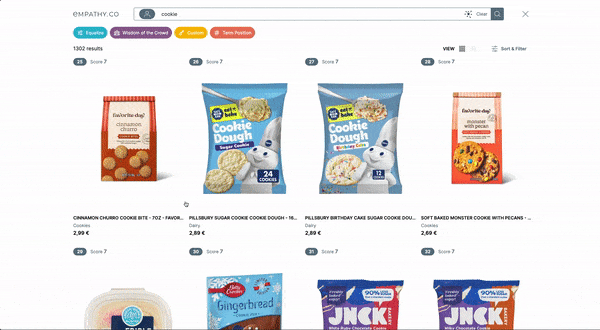Pioneering a way to measure trust in online retail
Pioneering a way to measure trust in online retail
September 28 2023
Did you know that the web, as we know it, is only 33 years old? Since its invention, it has quickly evolved, and regulating it has been challenging. You can consult an enormous variety of websites created by anyone worldwide, but it’s still difficult to know if you can trust those webpages.
When it comes to commerce, whether it’s keeping credit card details safe or personal data private, we place a considerable amount of trust in online retailers. In turn, they must assure us a safe, secure and non-intrusive shopping experience. And, of course, an experience without data breaches or invasive tracking practices.
And while it is possible to know whether a retailer is securing your data or respecting your consent choices, it remains to this day an incredibly tedious process. We needed to find a way to quickly identify which online retailers we can place our trust in.
What is the Retail Trust Index?
Addressing that need, Empathy’s Open Innovation team has created the first version of a programme that analyses a website with the goal of giving it an accurate trust score. In order to know if a site is respecting your choices, we’ve published, in collaboration with the Ethical Commerce Alliance, a website that ranks trust among the UK’s top retail brands, known as the Retail Trust Index.
As an exercise in transparency, let’s take a look at how this trust score is calculated and the journey taken to create it.
Measuring and defining trust
The first challenge was defining what trust in eCommerce entails. After thorough research, we identified four main pillars: Privacy, Security, Accessibility and Shopper Perception.
1. Privacy
Of the four measurements, privacy is one of the easiest to understand. If an online retailer respects the choices of its users and does not treat them like data sources to boost sales, we can trust them. It’s about seeing shoppers as individuals, not just data points.
Measuring privacy could be done in many different ways. Still, the intention remains to check if the data is correctly used and if the shopper is being informed about that use.
In this initial approach, we decided to use our software, more specifically, our CMP Analyzer and our MarTech Database.
With CMP Analyzer, we examine the cookies deployed during the page’s first load, before any consent is obtained from the shopper, and we refine this with a consultation of the MarTech Database. If the cookies are of the type that should be used, the score should be high.
But the score doesn’t stop at cookie analysis. We also take into account the number of trackers used. And they can negatively impact the privacy score, as the appropriate amount is, after all, zero.
2. Security
Another fundamental pillar of trust is security. Can the retailer be trusted to safeguard the consumer’s data? If the answer is yes, the trust score will be higher.
To calculate this score, we took publicly available information about data breaches. If a retailer has maintained a clean slate with no data breaches, they earn a perfect score. If there has been a data breach, the security score will be lower depending on whether it was a recent data breach or not.
3. Accessibility
The beauty of the web lies in its universal accessibility. Still, we surf the web in different ways, especially regarding our abilities. Websites must be inclusive, ensuring usability for all.
Can anyone, regardless of their abilities, trust your website? This is decided through accessibility. The accessibility score comes from various factors. A website rich in accessibility features will gain a high score.
Some examples could be:
- Alternative text on images.
- Contrast of the colour of the elements.
- Colour scheme (accounting for colour blindness)
- Presence of empty links and buttons.
- Keyboard-only navigation
- Screen reader functionality
4. Shopper perception
Giving a trust score is not something objective. Something that can only be done in one way. Therefore, we shouldn’t try to do it. We must consider subjective opinions, and the most valuable opinions are from the shoppers who interact with these websites.
Research was undertaken asking consumers their opinion on the retailers featured in the ranking, which is taken into account for the trust score.
This approach aims to provide a trust score that resonates with our real-world experiences, making the Retail Trust Index a more reliable and insightful tool for evaluating online retail trustworthiness.
Innovating a future of trust in retail
The Retail Trust Index, led by Empathy’s Open Innovation team and the Ethical Commerce Alliance, is a pioneering approach to demystifying the landscape of trust in online retail.
By analysing the four pillars of Privacy, Security, Accessibility, and Shopper Perception, the RTI provides a streamlined, user-friendly tool for consumers to gauge the trustworthiness of online retailers.
The initiative is a significant step towards a more transparent, secure, and inclusive online shopping environment, giving consumers the power to make informed decisions about where and how they shop.










